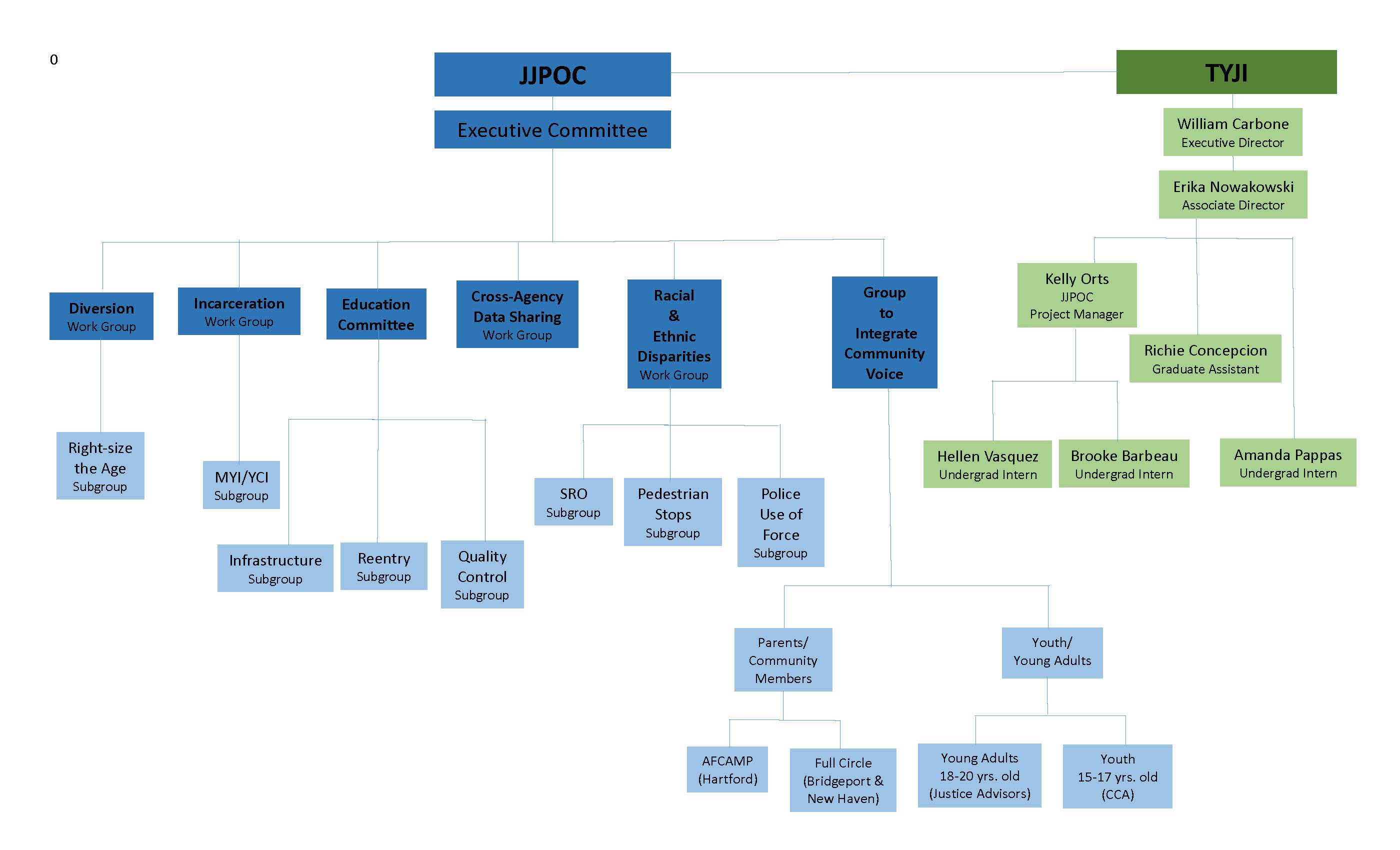
The chart above reflects the workgroup structure of the JJPOC that was updated in 2018 during the strategic planning process. Subgroups are identified as needed when a component of the work is deemed in need of having a dedicated group focused on the issue. Descriptions of the workgroups are below.
Co-Chairs
Erica Bromley, Connecticut Youth Services Association
Front-end/Limiting entry into the juvenile justice system
This group will be tasked to identify ways to increase and assess both the quality and availability of diversion programming. In order to do that, the group will ensure that youth have supports from youth-serving agencies (schools, Department of Children and Families, etc.) as viable alternatives to the formal juvenile justice system thereby reducing inappropriate referrals to the juvenile justice system. The group will identify sustainable funding for the Community-Based Diversion Plan and School-Based Diversion Framework through a variety of resources in order to address status offenders, such as truant or defiant youth, in community settings. A significant focus on setting a developmentally appropriate lower age limit of juvenile justice jurisdiction will be crucial to the overarching goal of the group
Co-Chairs
Judge Bernadette Conway
Attorney Christine Rapillo
Deep-end/reducing incarceration
This group will be tasked with supporting efforts to create and operate developmentally appropriate, small, residential settings that can provide therapeutic care for Connecticut’s youth who cannot succeed in less restrictive environments. Work will focus on achieving safe and humane conditions of confinement that are culturally responsive, conducive to healthy development and responsive to special populations (e.g., gender/sexual orientation) while continuing to work towards eliminating youth being held in adult systems pre- or post-trial. Increasing and improving re-entry support and services for youth will be targeted while improving the quality and availability of behavioral health care services, and education and vocational training. The overall work of the group will be providing evidence-based, developmentally appropriate responses as well as positive incentives to youth in the justice system.
Co-Chairs
Dr. Derrick Gordon, The Consultation Center at Yale University
Hector Glynn, The Village for Children and Families
The purpose of this group is to ensure that race and ethnicity data and the strategies to address disparities are interpreted and developed in true partnership with communities of color as well as ensuring the collection, review, and public reporting of race and ethnicity data at each important point of contact in the juvenile justice system.
The group will be tasked with enhancing and supporting opportunities for localized review (community oversight) of school and police practices, promoting the use of racial justice assessments of policy proposals that impact justice and identifying opportunities where inequities within the juvenile justice system can be effectively addressed. The group will also be tasked with reviewing and eliminating or reducing the barriers in the justice system that prevent or hinder youth in their ability to mature and “age out of crime” and lead productive, healthy, law-abiding lives.
Co-Chairs
Iliana Pujols, Connecticut Juvenile Justice Alliance
Janeen Reid, Full Circle
The role of this group is to identify and suggest ways to overcome the barriers to equal, sustainable participation with JJPOC work by those who have first-hand experience with the juvenile justice system. This group will use their first-hand knowledge to educate JJPOC members and provide input and feedback on policy and legislation. This workgroup includes:
- young people with current or prior juvenile justice system involvement,
- parents, guardians, and family of those with current or prior juvenile justice system involvement,
- victims of offenses committed by juveniles,
- those who live in communities with a high rate of juvenile arrests
The purpose of this group is not solely to identify individuals who may be appropriate for official appointment to the JJPOC, but to examine the operations of the JJPOC in order to encourage and support meaningful participation of community experts in meetings and eliminate barriers to their participation. For example, timing of meetings (during the work/school day), lack of transportation, stipends, childcare, feeling intimidated by the jargon used and titles held by people on the JJPOC need to be considered. Through their active participation in the JJPOC monthly meetings and workgroups and through focus group participation, they will directly educate and expand the knowledge of decision makers. The workgroup will also recommend ways the JJPOC can create a welcoming environment and process that value the input of community experts as equal partners with existing stakeholders.
Co-Chairs
Kyle Baudion, Office of Policy and Management
Brian Hill, Connecticut Judicial Branch
This group will be a resource and support for all JJPOC workgroups. With their expertise, they have been and will continue to be an advisory group to all of the workgroups and committees. Through their access to data, they will secure and provide appropriate interagency data for use by the workgroups. They will assist in the development of measures, but more importantly, provide insight into their efficacy and feasibility. In addition, through their understanding of the implications of implementing these measures, they will identify any barriers in funding needs.
Co-Chairs
Amy Vatner, The Children’s Community Programs of CT, Inc.
Representative Robyn Porter
Public Act 18-31 established an education committee to develop a detailed plan addressing concerns with overall coordination, supervision, provision and direction of all academic services and programs for youth in out of home placement. The committee was placed into effect on July 1st, 2018 to address the range of services for the justice-involved youth (that) must include, at a minimum, a traditional high-school diploma program, an accelerated credit recovery program, vocational training, and access to post-secondary options. Additionally, a recommendation was made to submit a plan for a single agency to be in charge of a statewide system for education transitional supports for children in custody.